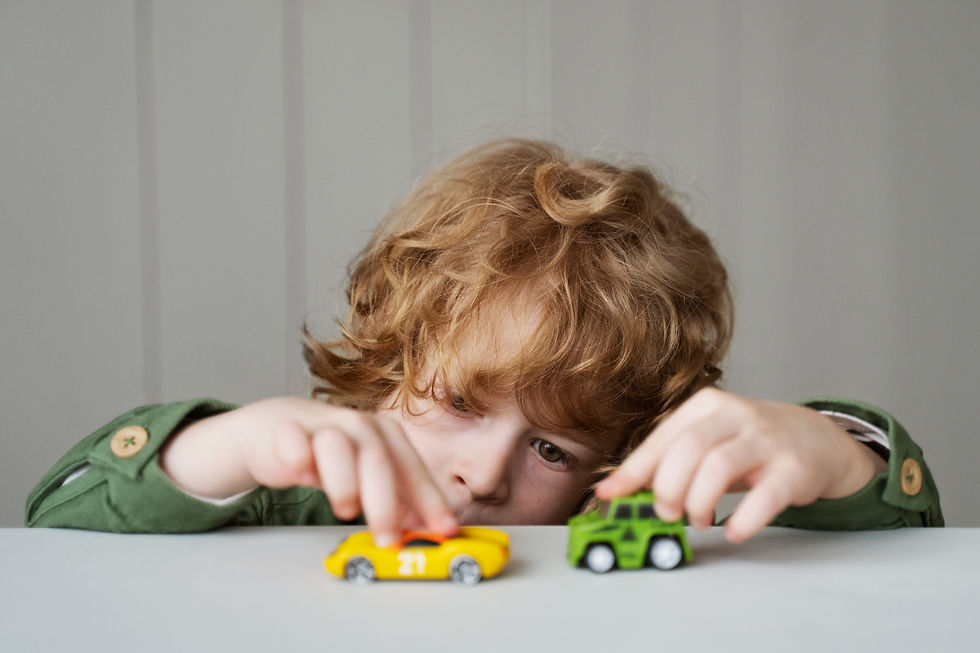How Focus Activities Can Improve Daily Routines for Children with ADHD
- olivia culpo
- Jun 23, 2025
- 4 min read
Kids with ADHD often encounter daily hurdles that can make their routines feel chaotic and daunting. Whether it’s the morning rush to get ready for school, tackling homework, or settling down for bedtime, what should be straightforward tasks can quickly become overwhelming struggles. However, incorporating structured focus activities for kids with adhd into a child's daily routine can help create more stability, lessen stress, and enhance their ability to concentrate.
Focus activities are tailored exercises or games designed to help children develop self-regulation, attention control, and the knack for completing tasks. These activities go beyond merely keeping kids occupied; they’re all about fostering cognitive and emotional growth by instilling a sense of control and predictability in their lives.

Understanding the Importance of Routines for Kids with ADHD
Routine plays a vital role for children with ADHD, as it helps to ease anxiety and curb impulsivity. Having a predictable schedule can make transitions smoother and lessen resistance to daily tasks. However, just having routines isn't enough. Without engaging methods to enhance attention and self-regulation, kids might still find it tough to manage even the most organized schedule.
That's where focus activities come into play. When woven into a daily routine, these activities give children a chance to practice their focus in a relaxed, often fun setting. Over time, this helps them develop the skills they need to complete tasks and feel more in control of their time.
How Focus Activities Support Key Parts of the Day
Let’s take a closer look at how focus activities can be applied throughout a child’s daily routine to build consistency and success.
Morning Routine Boosters
Mornings can be a whirlwind for kids with ADHD. Incorporating short focus activities before or after breakfast can really help them get their bearings and make those transitions a bit easier. For instance, a quick five-minute breathing exercise or a lively game like “Freeze Dance” can really kickstart their brains and help them step into the day with a clearer mindset.
Simple sequencing games or matching visual schedules can also reinforce the steps in their morning routine, like brushing their teeth, getting dressed, and packing their bags. These little tasks not only build focus through repetition but also offer a sense of accomplishment.
After-School Focus Time
After a long day at school, kids often find it tough to switch gears from the structured classroom to the more relaxed atmosphere at home. This is a perfect opportunity to introduce a fun focus activity that can help bridge that gap. Simple brain games like memory cards, matching puzzles, or sorting tasks can make it easier for children to transition from one mental space to another.
By incorporating these activities before diving into homework, you can help ease their restlessness and boost their concentration. It gives them a chance to mentally reset, making it much simpler for them to tackle their studies without feeling overwhelmed.
Homework Helpers
Homework can be a real challenge for kids with ADHD. One great way to tackle this is by breaking the homework into smaller, more manageable pieces. Using a timer, like in the Pomodoro Technique—where they work for 15 minutes and then take a 5-minute break—can really help kids who struggle with staying focused.
During those breaks, they can get up and do some quick physical activities, like jumping jacks, or play with fidget tools that provide sensory input without being too distracting. These little breaks can really boost their ability to dive back into their work without feeling overwhelmed.
Evening and Bedtime Wind-Down
The shift to bedtime can often be a tricky moment for many. To help ease the transition, try engaging in calming activities like guided drawing, reading together with a parent, or even playing simple sorting games to reduce overstimulation. Mindfulness practices, such as deep breathing or “body scan” meditations, can really help to calm the mind. When these rituals are practiced regularly, they send a clear message to the brain that it’s time to wind down and get ready for sleep.
Long-Term Benefits of Using Focus Activities Daily
When used consistently, focus activities do more than just help children get through the day. They gradually build important executive functioning skills, such as impulse control, task initiation, and emotional regulation.
These skills play a significant role in a child’s ability to succeed both academically and socially. Improved focus leads to better listening skills, smoother interactions with peers, and greater independence.
Moreover, by turning daily routines into opportunities for practice and success, children start to feel more confident in their abilities. This can reduce anxiety and frustration, making the entire family’s routine feel less stressful and more rewarding.
Tips for Parents to Get Started
If you're just starting out with focus activities, it's best to take it slow. Pick a specific time during the day to introduce a brief activity that aligns with your child's interests. Remember, being consistent is far more crucial than striving for perfection. You might find visual schedules or reward charts helpful for keeping your child motivated and tracking their progress.
It's also a great idea to involve your child in selecting the activities. When they have a say in what they do, they're much more likely to join in with enthusiasm. Consider changing up the activities each week to keep things exciting and engaging.
And don’t forget, patience is essential. Every child is unique, and it might take a little while to discover what resonates best with them. But with a bit of dedication and creativity, focus activities can truly become a meaningful part of your child's daily routine and contribute to their long-term growth.
Conclusion
Focus activities are so much more than just a way to kill time. They provide a fantastic chance for kids with ADHD to learn how to focus their attention, handle transitions, and boost their self-confidence. By carefully incorporating these activities into everyday life, parents can foster a structured and nurturing environment where children feel empowered to thrive—one step at a time.







Comments